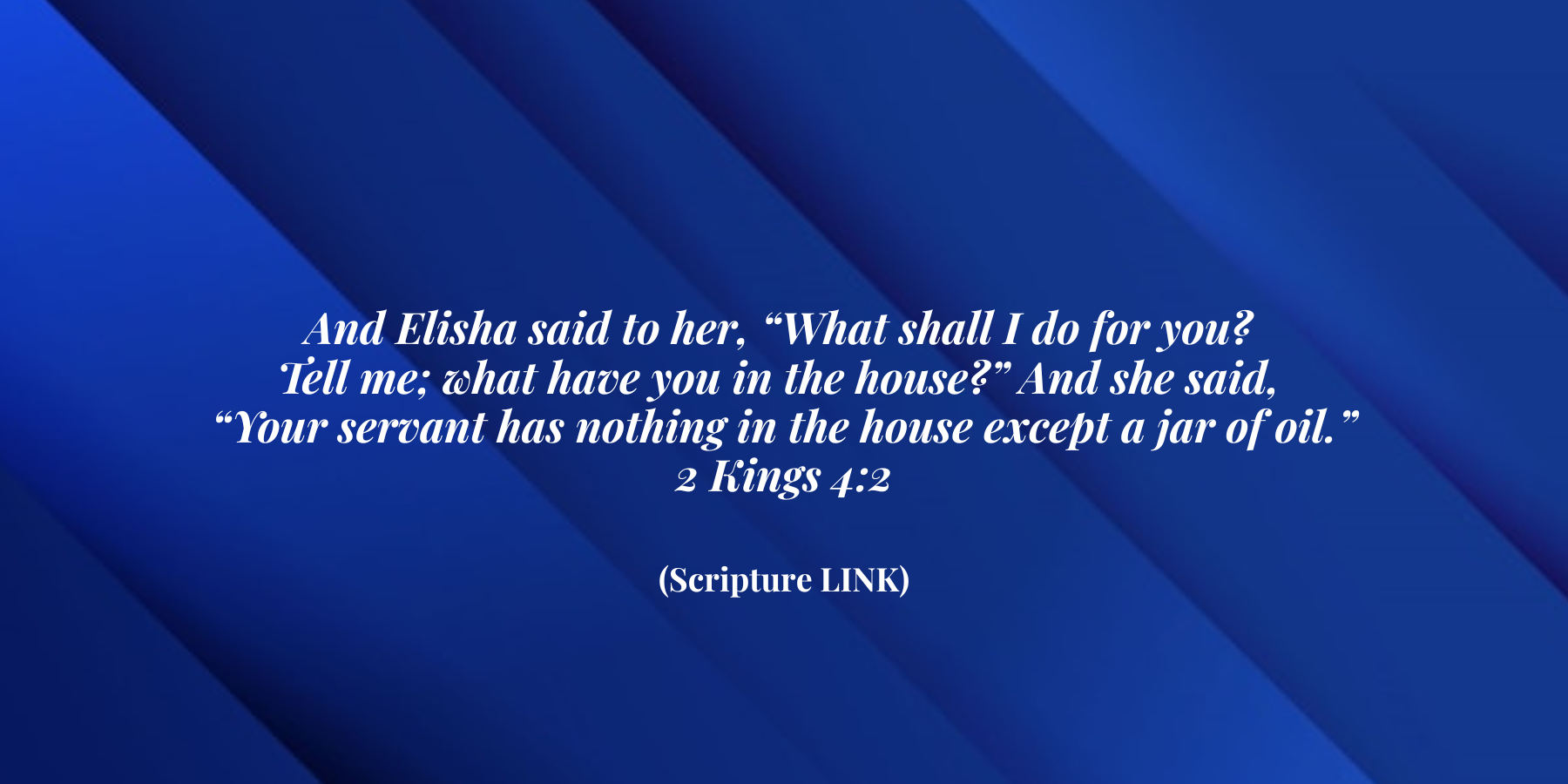How Can I Help You?
Little Is Much
Teaching Moment #2: When faced with an insurmountable need in another person’s life, please ask, “What do you want me to do?” or “How can I help you?”
Sharon W. Betters
Today’s Treasure
The widow’s pleas to Elisha imply he has a responsibility to take care of her because her husband was one of the faithful prophets who were responsible for leading people in worship, but worshipers were few and the prophets’ calling sometimes felt irrelevant in the context of the apostasy of the nation. King Ahab and Jezebel worshiped other gods and hated the prophets. Fear and apathy grew in the people who eventually didn’t see a need for God’s Word. The prophets often went into hiding because of Jezebel’s rage and hatred against them.
Josephus, the historian, tells us this widow was most likely the wife of Obadiah the prophet. Obadiah is the same one the Bible tells us hid, fed, and clothed one hundred prophets or sons of prophets pursued by Ahab and Jezebel. Obadiah risked his own life to provide for their safety.
If Josephus is correct, it’s possible the widow is destitute, in part, because her prophet husband used their family food, clothing, etc., to feed and care for these fellow prophets. If so, it’s possible this widow fought feelings of resentment because her husband left her with nothing.
The creditors decide to impose the Mosaic Law which gave them the right to force her sons to work off their father’s debt. Think of it. Her husband who faithfully served the Lord is dead. Instead of giving herself time to grieve, she must find ways to feed her sons. She has used every means possible even piling up debt. She is alone and desperate. Now she faces losing her sons. Is it possible she experienced not only anger toward her husband, but grief and anger toward God for bringing her to such a desperate place? The Scriptures don’t describe these emotions but as a woman and mother, I can see myself battling all of these feelings in the context of trying to trust God’s purposes in what seems a hopeless place.
A desperate widow, destitute, with debt she can never repay, about to lose her two sons, pleads for help from Elisha, God’s prophet. Elisha's first response is, “What shall I do for you?”
What a beautiful question for anyone to ask someone in misery. Elisha’s first words must have fanned the spark of hope in this broken woman. But then he says, “Tell me, what have you in your house?”
What was Elisha thinking?
LIFE-GIVING ENCOURAGEMENT
Let's imagine this widow as a normal, emotional woman who is about to watch her sons dragged away into slavery. Do you think Elisha's question satisfied the widow's expectations? Implied in her initial plea to Elisha is, "YOU need to fix this. My husband was a faithful servant - YOUR servant. You owe him this, Elisha."
Did she feel his response minimized her need, her right to cry out in despair? Maybe Elisha came across as indifferent to her anguish. I wonder if the widow refrained from lashing back with, "Do you think I'm an idiot, that I haven't used everything possible to save my boys? What kind of a question is that!"
Elisha doesn't join her despair party, but instead, his question challenges her to get a grip and consider carefully the blessings God has entrusted to her. He assumes there is still something in her house God can grow into a miracle.
Elisha’s question forces her to reboot her thinking to get her mind and emotions aligned with Elisha's direction. She responds, "I have nothing.....except a little oil...."
Ahhh….”I have nothing…..except….” Unbeknownst to this widow, Elisha was about to show her how to attempt something great for God and to expect something great from God.
Friends, is hopelessness blinding you to the treasures you have in “your house”? Take a few minutes and jot down blessings previously hidden from tear-filled eyes. Now pray for the Lord to show you how what appears little in the context of your circumstances could become “much” as you pursue God’s purposes.
Are you “Elisha”, the one being asked for help by a hysterical friend? Help her navigate and control her emotions with a question, “What shall I do for you?” and pray as you help turn her heart toward Jesus.
PRAYER
Oh Father, challenge us, remind us we are never hopeless and without support when we belong to You. Open our eyes to blessings we have overlooked and consider that though they seem insignificant or unimportant in the face of our present circumstances, they could be Your answer to our cries of “Help me!”
Sharon W. Betters is a mother, grandmother, great-grandmother, pastor’s wife, and cofounder of MARKINC Ministries, where she is the Director of Resource Development. Sharon is the author of several books, including Treasures of Encouragement, Treasures in Darkness, and co-author with Susan Hunt of Aging with Grace. She is the co-host of the Help & Hope podcast and writes Daily Treasure, an online devotional.
Contact Sharon with comments or questions at dailytreasure@markinc.org.




